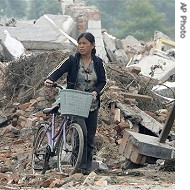-
(单词翻译:双击或拖选)
By Stephanie Ho
Beijing
20 June 2008
The World Health Organization is praising the Chinese government for taking immediate1 steps to halt the outbreak of infectious diseases in the aftermath of the huge earthquake that struck southwestern Sichuan province in May. At the same time, the international health body warns of a growing demand for mental health care. Stephanie Ho has more on the story from Beijing.
 |
| More than a million people could be at risk if lake overflows2 as result of flooding, strong aftershocks |
The World Health Organization's China representative Hans Troedsson recently visited the quake disaster area and praised the Chinese government for taking steps to prevent major outbreaks of infectious diseases.
"One of the reasons for that is clearly that at a very early stage, the affected3 population was provided with safe water, electricity, shelter and sanitation4 facilities, which we know are the main routes for transmission," he said.
At the same time, he says the Chinese Ministry5 of Health has asked the WHO to provide specific support for dealing6 with mental health.
"What we know is people who have gone through something like this will have some kind of need of psycho-social support," said Troedsson.
He says most of the time, the solutions are relatively7 simple and involve a person returning to as much of a normal life as possible. At the same time, he says it is usually the case that up to 10 percent of the affected population will need professional mental health services.
Meanwhile, the WHO also is in the process of consulting with the Chinese government on rebuilding hospitals to withstand future natural disasters.
WHO engineering consultant8 Tony Gibbs said there are ways to make medical buildings structurally9 safer, and only add less than five percent to the cost of construction.
"None of these things can be introduced after the start of design," he said. "You have to make a policy decision at the beginning of the design, before, at the first thinking of the design, that this is what we're going to do."
WHO experts who recently visited the quake zone, are preparing to present their suggestions to the Chinese government.
WHO public health expert Angela Merianos said she was most struck by how Chinese health authorities coped with not being able to rely on their Internet-based epidemic10 tracking system.
"Because the communications infrastructure11 was damaged after the earthquake, they set up - very, very quickly - quite an innovative12 new approach that involved reporting using mobile phones," said Merianos.
She says this mobile phone reporting system is the reason Chinese authorities are confident they did not miss any significant outbreaks.
 收听单词发音
收听单词发音
1
immediate

|
|
| adj.立即的;直接的,最接近的;紧靠的 | |
参考例句: |
|
|
|
2
overflows

|
|
| v.溢出,淹没( overflow的第三人称单数 );充满;挤满了人;扩展出界,过度延伸 | |
参考例句: |
|
|
|
3
affected

|
|
| adj.不自然的,假装的 | |
参考例句: |
|
|
|
4
sanitation

|
|
| n.公共卫生,环境卫生,卫生设备 | |
参考例句: |
|
|
|
5
ministry

|
|
| n.(政府的)部;牧师 | |
参考例句: |
|
|
|
6
dealing

|
|
| n.经商方法,待人态度 | |
参考例句: |
|
|
|
7
relatively

|
|
| adv.比较...地,相对地 | |
参考例句: |
|
|
|
8
consultant

|
|
| n.顾问;会诊医师,专科医生 | |
参考例句: |
|
|
|
9
structurally

|
|
| 在结构上 | |
参考例句: |
|
|
|
10
epidemic

|
|
| n.流行病;盛行;adj.流行性的,流传极广的 | |
参考例句: |
|
|
|
11
infrastructure

|
|
| n.下部构造,下部组织,基础结构,基础设施 | |
参考例句: |
|
|
|
12
innovative

|
|
| adj.革新的,新颖的,富有革新精神的 | |
参考例句: |
|
|
|















